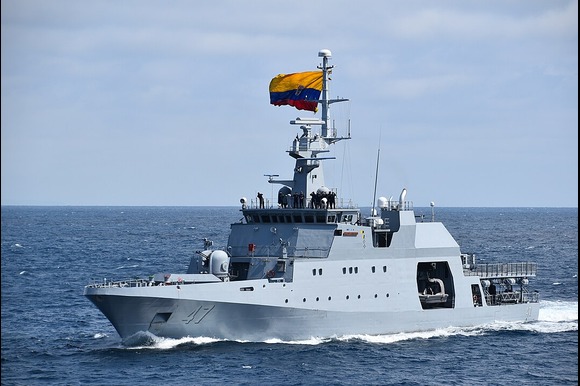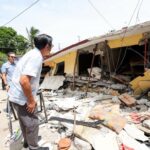Bogotá / Washington – Colombian President Gustavo Petro has alleged that a boat recently destroyed in a US airstrike in the Caribbean was “Colombian, with Colombian citizens inside,” sparking a sharp rebuttal from the White House, which described his accusation as “baseless and reprehensible.”
In recent weeks, the United States military has conducted at least four strikes against vessels in the Caribbean Sea, killing 21 people. Washington has maintained that the operations—carried out in international waters—targeted “narco-traffickers” allegedly involved in large-scale drug smuggling activities.
However, the US government has not released detailed information or evidence regarding the identities of those on board, fueling growing concern and condemnation from Latin American nations, which have questioned the legality of such actions under international law.
Petro Says Caribbean Becoming ‘New War Scenario’
President Petro, known for his outspoken criticism of US foreign policy in Latin America, claimed on social media platform X (formerly Twitter) that the latest bombing marks a dangerous escalation.
“A new war scenario has opened up: the Caribbean,” Petro wrote. “Indications show that the last boat bombed was Colombian with Colombian citizens inside it. I hope their families come forward and report it.”
He further accused Washington of pursuing what he called a “war for oil” rather than a genuine fight against drug trafficking.
“There is no war against smuggling; there is a war for oil, and it must be stopped by the world. The aggression is against all of Latin America and the Caribbean,” Petro said.
The Colombian leader did not provide additional details about the alleged victims or present evidence to substantiate his claim.
White House Rejects Petro’s Allegation
In a strongly worded response, the White House dismissed Petro’s statement, urging him to retract his remarks publicly.
A spokesperson said: “We look forward to President Petro publicly retracting his baseless and reprehensible statement. While the two nations have policy differences, the United States remains committed to close co-operation on a range of shared priorities, including regional security and stability.”
The Biden administration (and later the Trump administration) has argued that the strikes were conducted in accordance with international maritime law, targeting vessels “posing imminent threats” in what US defense officials described as counter-narcotics operations.
US Senate Rejects Effort to Curb Trump’s Military Strikes
The controversy intensified after the US Senate narrowly rejected a measure that sought to limit President Donald Trump’s authority to carry out such strikes without congressional approval.
The proposal, introduced by Democratic Senators Adam Schiff and Tim Kaine, would have required the administration to seek congressional consent before engaging in further military action against boats in the Caribbean. The measure failed in a 48-51 vote, split largely along partisan lines.
Senator Schiff, who had publicly voiced opposition to the strikes, said he feared the military operations could expand unchecked and risk entangling the US in unauthorized conflicts.
Petro replied to Schiff’s post on X, supporting his stance and warning of the broader dangers of militarization in the Caribbean.
Legal and Geopolitical Tensions Over US Actions
The US military’s actions have raised questions among legal experts and human rights groups regarding the justification for the use of force.
Earlier this month, a leaked internal memo sent to members of Congress revealed that the US government now considers itself to be engaged in a “non-international armed conflict” in the Caribbean region.
This classification effectively grants the administration greater leeway to exercise wartime powers, including authorizing strikes that result in the killing of individuals labeled as “enemy fighters,” even if they do not pose an immediate threat.
Critics argue that this framing allows Washington to circumvent both international law and domestic oversight.
Regional and Political Fallout
The strikes—most of which reportedly occurred near Venezuelan waters—have sparked outrage across Latin America. Regional leaders, including Petro, have condemned what they view as violations of sovereignty and acts of aggression against the region.
Speaking at the EU Global Gateway Forum in Brussels on Thursday, President Petro said he had called for an emergency meeting of Caribbean foreign ministers to address the escalating crisis.
“The Caribbean must speak with one voice,” Petro said, adding that Latin American governments needed to “stand against the normalization of military action in our seas.”
Meanwhile, the US has continued to justify the strikes as part of its anti-narcotics campaign, claiming the targeted vessels were transporting illegal drugs from South America toward North American and European markets.
The first reported US strike, on 2 September, targeted what officials described as a “Venezuelan drug boat,” setting off debate about whether the action violated sovereign maritime boundaries.
Trump’s Expanded Use of Military Power Against Cartels
President Trump, who has long championed a hardline approach to transnational crime, has previously designated several Latin American drug cartels—including those in Mexico, Venezuela, and Ecuador—as terrorist organizations.
This designation grants the US government broader powers to conduct extraterritorial operations, including military strikes and drone attacks, against individuals or entities linked to these groups.
Supporters of the policy argue it strengthens America’s ability to combat organized crime and protect its citizens. Critics, however, warn that the broad scope of the designation risks civilian casualties and undermines diplomatic relations with regional allies.






